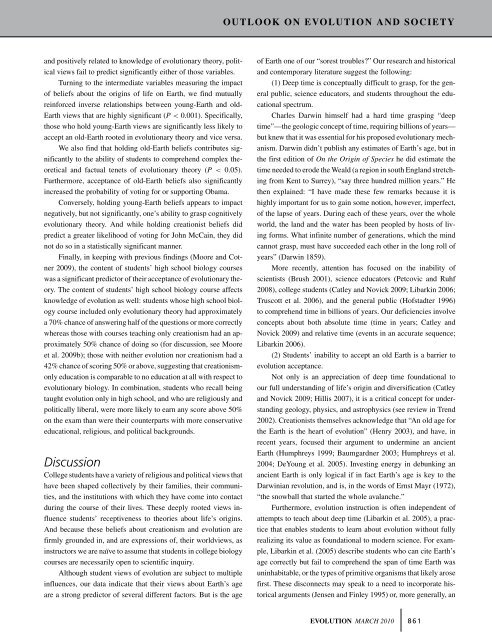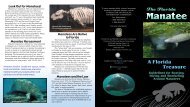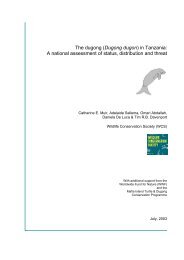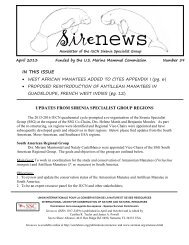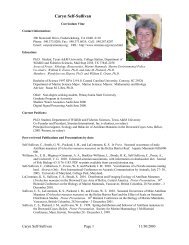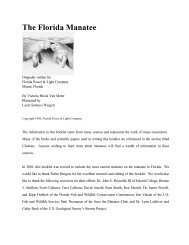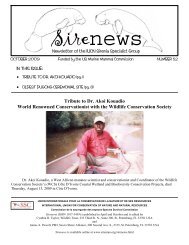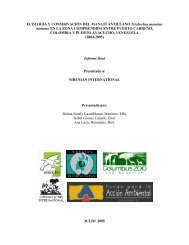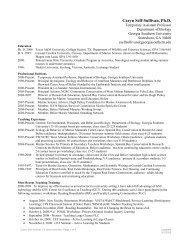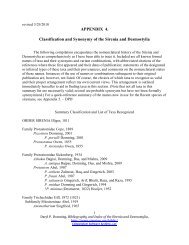2012 COURSE DATES: AUGUST 4 – 17, 2012 - Sirenian International
2012 COURSE DATES: AUGUST 4 – 17, 2012 - Sirenian International
2012 COURSE DATES: AUGUST 4 – 17, 2012 - Sirenian International
Create successful ePaper yourself
Turn your PDF publications into a flip-book with our unique Google optimized e-Paper software.
and positively related to knowledge of evolutionary theory, political<br />
views fail to predict significantly either of those variables.<br />
Turning to the intermediate variables measuring the impact<br />
of beliefs about the origins of life on Earth, we find mutually<br />
reinforced inverse relationships between young-Earth and old-<br />
Earth views that are highly significant (P < 0.001). Specifically,<br />
those who hold young-Earth views are significantly less likely to<br />
accept an old-Earth rooted in evolutionary theory and vice versa.<br />
We also find that holding old-Earth beliefs contributes significantly<br />
to the ability of students to comprehend complex theoretical<br />
and factual tenets of evolutionary theory (P < 0.05).<br />
Furthermore, acceptance of old-Earth beliefs also significantly<br />
increased the probability of voting for or supporting Obama.<br />
Conversely, holding young-Earth beliefs appears to impact<br />
negatively, but not significantly, one’s ability to grasp cognitively<br />
evolutionary theory. And while holding creationist beliefs did<br />
predict a greater likelihood of voting for John McCain, they did<br />
not do so in a statistically significant manner.<br />
Finally, in keeping with previous findings (Moore and Cotner<br />
2009), the content of students’ high school biology courses<br />
was a significant predictor of their acceptance of evolutionary theory.<br />
The content of students’ high school biology course affects<br />
knowledge of evolution as well: students whose high school biology<br />
course included only evolutionary theory had approximately<br />
a 70% chance of answering half of the questions or more correctly<br />
whereas those with courses teaching only creationism had an approximately<br />
50% chance of doing so (for discussion, see Moore<br />
et al. 2009b); those with neither evolution nor creationism had a<br />
42% chance of scoring 50% or above, suggesting that creationismonly<br />
education is comparable to no education at all with respect to<br />
evolutionary biology. In combination, students who recall being<br />
taught evolution only in high school, and who are religiously and<br />
politically liberal, were more likely to earn any score above 50%<br />
on the exam than were their counterparts with more conservative<br />
educational, religious, and political backgrounds.<br />
Discussion<br />
College students have a variety of religious and political views that<br />
have been shaped collectively by their families, their communities,<br />
and the institutions with which they have come into contact<br />
during the course of their lives. These deeply rooted views influence<br />
students’ receptiveness to theories about life’s origins.<br />
And because these beliefs about creationism and evolution are<br />
firmly grounded in, and are expressions of, their worldviews, as<br />
instructors we are naïve to assume that students in college biology<br />
courses are necessarily open to scientific inquiry.<br />
Although student views of evolution are subject to multiple<br />
influences, our data indicate that their views about Earth’s age<br />
are a strong predictor of several different factors. But is the age<br />
OUTLOOK ON EVOLUTION AND SOCIETY<br />
of Earth one of our “sorest troubles?” Our research and historical<br />
and contemporary literature suggest the following:<br />
(1) Deep time is conceptually difficult to grasp, for the general<br />
public, science educators, and students throughout the educational<br />
spectrum.<br />
Charles Darwin himself had a hard time grasping “deep<br />
time”—the geologic concept of time, requiring billions of years—<br />
but knew that it was essential for his proposed evolutionary mechanism.<br />
Darwin didn’t publish any estimates of Earth’s age, but in<br />
the first edition of On the Origin of Species he did estimate the<br />
time needed to erode the Weald (a region in south England stretching<br />
from Kent to Surrey), “say three hundred million years.” He<br />
then explained: “I have made these few remarks because it is<br />
highly important for us to gain some notion, however, imperfect,<br />
of the lapse of years. During each of these years, over the whole<br />
world, the land and the water has been peopled by hosts of living<br />
forms. What infinite number of generations, which the mind<br />
cannot grasp, must have succeeded each other in the long roll of<br />
years” (Darwin 1859).<br />
More recently, attention has focused on the inability of<br />
scientists (Brush 2001), science educators (Petcovic and Ruhf<br />
2008), college students (Catley and Novick 2009; Libarkin 2006;<br />
Truscott et al. 2006), and the general public (Hofstadter 1996)<br />
to comprehend time in billions of years. Our deficiencies involve<br />
concepts about both absolute time (time in years; Catley and<br />
Novick 2009) and relative time (events in an accurate sequence;<br />
Libarkin 2006).<br />
(2) Students’ inability to accept an old Earth is a barrier to<br />
evolution acceptance.<br />
Not only is an appreciation of deep time foundational to<br />
our full understanding of life’s origin and diversification (Catley<br />
and Novick 2009; Hillis 2007), it is a critical concept for understanding<br />
geology, physics, and astrophysics (see review in Trend<br />
2002). Creationists themselves acknowledge that “An old age for<br />
the Earth is the heart of evolution” (Henry 2003), and have, in<br />
recent years, focused their argument to undermine an ancient<br />
Earth (Humphreys 1999; Baumgardner 2003; Humphreys et al.<br />
2004; DeYoung et al. 2005). Investing energy in debunking an<br />
ancient Earth is only logical if in fact Earth’s age is key to the<br />
Darwinian revolution, and is, in the words of Ernst Mayr (1972),<br />
“the snowball that started the whole avalanche.”<br />
Furthermore, evolution instruction is often independent of<br />
attempts to teach about deep time (Libarkin et al. 2005), a practice<br />
that enables students to learn about evolution without fully<br />
realizing its value as foundational to modern science. For example,<br />
Libarkin et al. (2005) describe students who can cite Earth’s<br />
age correctly but fail to comprehend the span of time Earth was<br />
uninhabitable, or the types of primitive organisms that likely arose<br />
first. These disconnects may speak to a need to incorporate historical<br />
arguments (Jensen and Finley 1995) or, more generally, an<br />
EVOLUTION MARCH 2010 861


